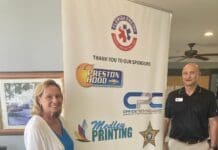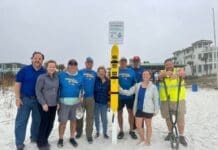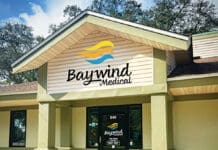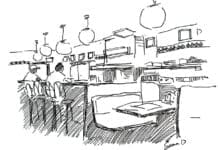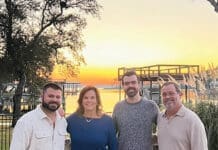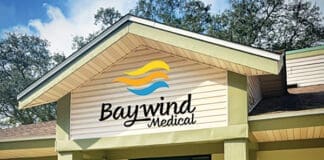By Doug Stauffer
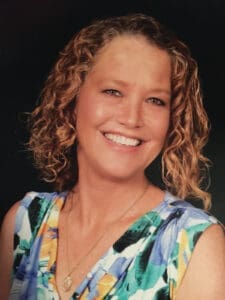 In the heart of Fort Walton Beach, Donna Morgan is a testament to resilience and the transformative power of determination. As the One Hopeful Place (OHP) manager and Independent Living Program manager, Donna, along with her dedicated team, Liz Qualiana and Mike Curran, have made an indelible impact on the lives of countless others.
In the heart of Fort Walton Beach, Donna Morgan is a testament to resilience and the transformative power of determination. As the One Hopeful Place (OHP) manager and Independent Living Program manager, Donna, along with her dedicated team, Liz Qualiana and Mike Curran, have made an indelible impact on the lives of countless others.
Donna’s journey to her current role at OHP is a story of strength and redemption. She was raised in Fort Walton Beach and attended Wright Elementary, Pryor Junior High and Chocatwahchee High School.
She faced the challenges of early motherhood and the demands of working multiple jobs to make ends meet. But life took a darker turn as she grappled with the loneliness of being a military spouse with a husband on long deployments. Her struggle with alcohol began as a coping mechanism, initially social. But, it soon became a relentless life companion.
Tragedy struck when she received the devastating news of her husband’s untimely death in a car accident when he was 34 years old. Donna’s life spiraled into chaos as she descended deeper into alcoholism, becoming a single mother struggling to hold everything together. It was in the depths of despair, on August 25, 1997, that she found the strength to choose sobriety. Donna’s determination to be there for her two children ignited a remarkable transformation.
She enrolled in college and earned her Bachelor’s degree, followed by a Master’s in Public Administration and the groundwork for a second Master’s in Criminal Justice. Throughout this journey, Donna maintained her sobriety, holding onto the promise she made to herself, her children and God that she would never drink again.
Her career at Bridgeway Center, where she began as a mental health case manager in 2003, was pivotal in her path to recovery and self-discovery. Donna’s work led her to the unsheltered population in 2004, and she has since dedicated her career to helping those in need. Her Bridgeway Center family provided unwavering support and solidarity through her personal and professional struggles.
Donna is not only a survivor but also a beacon of hope for her two daughters, both of whom faced their battles with addiction. With love and support, they, too, found sobriety and are now thriving. Both are productive, with the youngest on the path to becoming a Certified Peer Specialist.
Throughout her career, Donna has learned that real change cannot be forced upon others; it must come from within. She believes in meeting individuals where they are, offering them the tools to progress, and being a living example of what it takes. Compassion and understanding are at the core of her approach, recognizing that trauma and mental health struggles can alter one’s life course.
 In 2020, Donna joined One Hopeful Place (OHP), a shelter dedicated to making a difference in the lives of the unsheltered and less fortunate. Her role in helping open the new Men’s Place, enhancing the Ladies Place, and participating in the launch of the cold night shelter has been the most fulfilling experience of her career. Donna witnesses daily transformations in the lives of OHP residents, helping them thrive, recover, and rebuild their lives.
In 2020, Donna joined One Hopeful Place (OHP), a shelter dedicated to making a difference in the lives of the unsheltered and less fortunate. Her role in helping open the new Men’s Place, enhancing the Ladies Place, and participating in the launch of the cold night shelter has been the most fulfilling experience of her career. Donna witnesses daily transformations in the lives of OHP residents, helping them thrive, recover, and rebuild their lives.
Donna’s work at OHP is a shining example of her dedication to her community. She serves on various boards, including the Okaloosa County Transportation Disadvantage Board, the National Coalition for the Homeless membership board (NCH), and the American Foundation for Suicide Prevention (AFSP) Panhandle Board, where she advocates for mental health and suicide prevention on a state and national level.
Her commitment to advocacy and helping others has earned her numerous awards, including the Award of Excellence and the Distinguished Service Award from Bridgeway Center, the Teddy Award and the Above and Beyond Award from the FWB Chamber Executive Committee, and the Outstanding Mental Health Professional award from The Mental Health Association of Okaloosa-Walton, among others.
Donna Morgan’s journey is a testament to the power of redemption, resilience and the incredible impact one person can have on the lives of others. Her story is an inspiration, reminding us all that even in the darkest times, there is always hope, and with determination, we can overcome the most formidable challenges life throws our way. Donna continues to be a guiding light, offering hope and support to those who need it most, one step at a time. Donna has six grandchildren and cares for her father.
The Long Neck Bottle (Donna’s Story In Her Own Words)
By Donna Morgan with Doug Stauffer
How does one reach rock bottom, gazing up through a bottle to see the world? Is it a gradual descent, or does it happen overnight? Sometimes, it’s hard to acknowledge it’s even happening at all. Perhaps it’s a choice to remain oblivious, or maybe facing the harsh reality of life is too painful. Did it start before Chris died and grow so vast, warm, and comforting that you couldn’t resist its embrace?
The bottle becomes an inviting companion. It doesn’t talk back or pass judgment; it takes over slowly and consumes your soul. You once had friends who knew you, cared for you and stood by your side until the bottle intervened. It lures you in, and off you go into that dark abyss you believe is exclusively yours. No one comprehends why you seek solace there. It’s different; there’s no need to ponder life’s mysteries. There’s no need to dwell on why he’s gone or what you wished you had said before he left. Trying to communicate now feels utterly futile. Will he hear you? Will he understand how deeply you love and miss him? Does he perceive that agonizing void in your heart? Does anyone grasp your pain? When you’re inside the bottle, you find a brief respite. You can’t hurt or feel the emptiness, because the bottle becomes your only companion.
Your children are suffering, but you can’t offer help. Your anguish is overpowering, so you don’t bother; you reach for the bottle. They’ll be okay; they don’t need you because the bottle is beckoning. It makes all the pain vanish away. It doesn’t ask for a hug or demand your attention; it merely calls you into its sweet, beautiful, warm euphoria that belongs to you alone.
Then you wake up, and it’s all still there. The pain, the deep void in your soul, seems to crush your very existence. Your head is throbbing, and the day is slipping away. It’s time to fulfill your duties as a mother: prepare meals, do the laundry, sign the papers, and quickly get everything done so you can reunite with your friend, the bottle. Are your actions a facade to conceal your absence? Will they notice if you slip away? “I’ll be back after I meet my friend.”
I suppose this is rock bottom. The orange suit doesn’t fit quite right, and it’s terrifying. Have I harmed anyone? Sitting here, I realize I must sever ties with this friendship. It won’t be easy; losing a best friend is difficult. However, losing the rest of my family would be even more agonizing. After all, I am all they have left. He may be gone, but he looks down on me, trying to convey that the children need me. I am significant to somebody, and life must continue for us. It needs to be a functional life.
I embarked on my journey back two and a half years ago, in 1997, and every step has been a struggle. It’s not easy; it requires hard work and a profound commitment to being the best version of myself. Now, I walk the path of sobriety and live the life of a true friend and mother to my children and myself. I live my life looking up towards the light, giving thanks to my higher power, and seeking His guidance to remain the sober spirit I am today.

